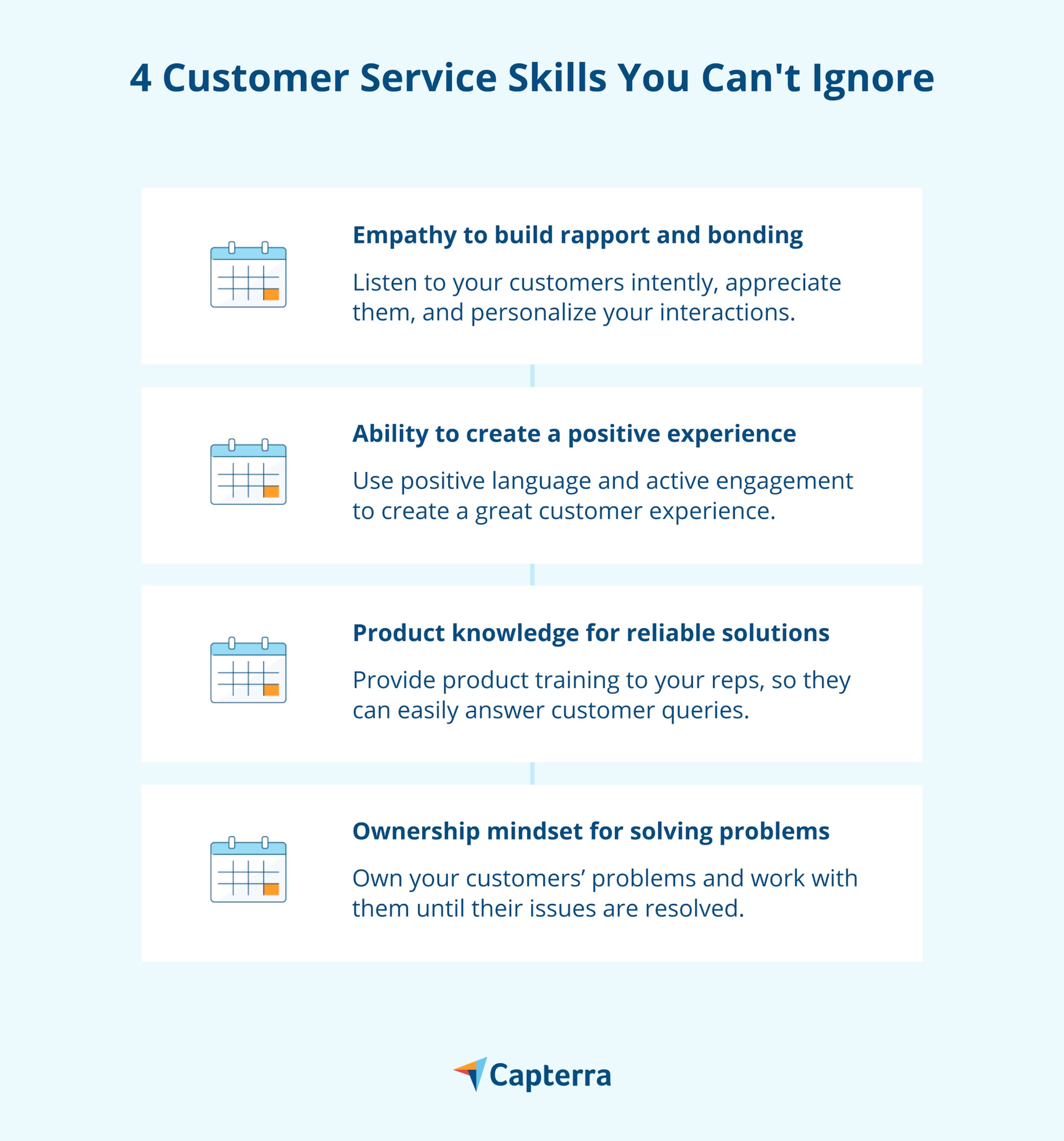Move beyond traditional customer service skills. Here are the four best customer service skills to keep your customers happy and satisfied.

Customers, these days, have high service expectations. They don’t just want solutions to their issues—they also expect to be treated in a friendly way. That means your customer service reps must have good soft skills as well as up-to-date product knowledge.
You should, therefore, hire agents that can empathize with customers, speak politely, and gain in-depth knowledge about your company and its products. If you miss the mark, you may experience customer and revenue loss due to unsatisfactory customer service.
Don’t worry though because we’ve got you covered. Here’s a list of the four skills your reps must have to offer good customer service. Watch out for these when hiring new agents or upskill your existing workforce to ensure they’re up to date with them.

1. Empathy to build rapport and bonding with customers
Empathy, in the context of customer service, means an agent’s ability to understand what customers are feeling and connect with them emotionally. Empathy will allow your reps to strike a rapport with customers and make them feel heard.
Here’s how you can show empathy, an essential skill for good customer service:
Listen carefully and without bias: Listen to customers with an open mind to understand their problems. Assure them that they’re heard by repeating statements such as “If I understand you correctly, the issue seems to be with the product’s Y feature” or “What I hear you say is the product’s X isn’t working. Have I got it right?”
Allow customers to express themselves: If angry customers call, don’t interrupt them or talk them down. Let them vent. Acknowledge what they say and use positive phrases such as “Yes, I understand what you’re saying” and “I hear you and completely understand what you’re going through.”
Appreciate your customers: Appreciate your customers to show them they’re valued and respected. Use statements such as “Thanks for reaching out to us” and “We appreciate your patience” to let them know you value their time and business.
Personalize customer interactions: Use the first person “I” to personalize conversations and reassure customers of your support. Add a human touch to every customer interaction by using statements such as "I would feel the same way."
2. Ability to create a positive customer experience
Your customer service professional must have the tact to create a positive customer experience using clear speech and patient listening.
According to Gartner, this tactfulness is known as the ability to "engineer experiences" (full report available to Gartner clients only).
Let’s look at some ways to create a positive customer experience:
Actively engage and participate in conversations: When communicating with customers, demonstrate active engagement. Your customer service rep must make customers feel heard and understood using statements such as “So what you just described sounds like…, is that correct?” versus “Sorry, can you repeat that?”
Have purposeful conversations to build rapport: Ask targeted questions to get important details from customers, for instance, their unmet needs or unknown motivations. Consider saying, “What’s taking you to Brussels for this trip? Why don’t you go a day early and tour the city?” instead of “Sorry, the flight tickets aren’t available.”
Replace negative phrases with positive alternatives: Use statements such as “What I can do is place this request for you today, and it’ll be ready tomorrow. In the meanwhile, you can … .” instead of “Unfortunately, I can’t help you with this today.” A positive attitude can help turn a potentially poor customer service experience into a good one.
Show an understanding about customer concerns: Demonstrate your understanding of customer complaints or issues by offering useful recommendations, especially when a customer's first choice isn’t available. For example, consider saying, “We have the XYZ model in stock. This one has better functionality for editing documents, which is what you were looking for,” instead of “Sorry! We don’t have that model in stock.”
3. In-depth product knowledge
Besides great interpersonal skills, your customer service representative should also have in-depth product knowledge. If your rep isn’t a subject matter expert, he or she won’t be able to understand customers’ problems, let alone cater to their needs. Remember, most agents develop customer service skills over time.
There are, however, ways you can help your agents acquire product knowledge faster, including:
Have product demos for your customer service team: Your customer service agents will be able to explain product features only if they themselves understand the products. Have dedicated demos for your customer service team, so they get familiar with your products. In the process, they can also give first-hand feedback to help you make product improvements.
Provide regular product training to your staff: Create a dedicated training program to help your customer service representatives easily answer customer questions about products or services. Have frequent refreshers and training assessments to ensure they’re updated about any changes or updates.
An example to consider is UK-based health supplement retailer Holland & Barrett. The company has built the Holland Barrett Training Academy where all of its staff members are rigorously trained and assessed to provide customers with clear, concise, and up-to-date information about its range of health and wellbeing products.
4. An ownership mindset for solving problems
Your agents must own customers’ problems and try solving them proactively. They should have a mindset to not stop until the issue is resolved. They should also be able to handle customer complaints autonomously, i.e., without escalating to any senior or manager.
When hiring for a customer service agent, look for the following behaviors that demonstrate autonomous problem-solving (full report available to Gartner clients only):
Personal agility: Your customer service representatives must be adaptable, so they can handle unique queries innovatively. They should be able to address even those customer issues that don’t have a standard resolution procedure.
Critical thinking: Your customer support agents must have the ability to find the root cause behind customer problems. They must also possess critical thinking skills to foresee any other related issues that may come up and offer resolutions for them as well.
An example of problem-solving that includes personal agility and critical thinking
A customer browses through an eCommerce site and doesn’t find a pair of cotton socks from a recently launched brand. He calls the customer support helpline to inquire about it.
The customer service representative, instead of taking the standard route of declining the customer, thoughtfully asks him some questions and finds out he has sweaty feet. Foreseeing that cotton socks can create problems for sweaty feet, the agent ingeniously recommends another brand that makes socks especially meant for sweaty feet. The customer buys a pair of socks on the spot and leaves satisfied.
Problem-solving skills and an ownership mindset can be inherent, but they can also be fostered and nurtured. Set up a reward structure to motivate your employees and have them walk that extra mile for customers.
Final thoughts
Besides focussing on training your staff in the skills discussed above, you can also invest in a customer service tool to maintain a centralized database of all customer details. Check out Capterra’s Top 20 Report for customer service software. Also, here’s our customer service software buyers guide to get an in-depth understanding of features and benefits.